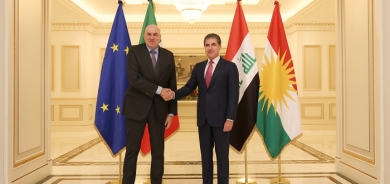Richard W. Bulliet for Gulan Magazine: The greatest likelihood is that Al-Assad will leave and his place will be taken by a general, possibly a Sunni but more likely another Alawi
October 26, 2011
Exclusive Interviews

Regarding to the Syrian case and the changes in the area, Gulan Magazine have exclusively interviewed the Professor Richard W. Bulliet, a Professor of History in Columbia University, New York City. And the Professor Bulliet replied to our questions as shown bellow:* Syria is repeating the Libya’s scenario and Al-Assad wants to imitate Ghazzafi, especially since he is about to announce war against its own nation. So, in your view; where to Syria’s situation is heading?
- I do not see a strong comparison between Al-Assad and Qadhdhafi. The Syrian army is much stronger and more professional than the Libyan army, and Al-Assad still enjoys substantial legitimacy deriving from his opposition to the United States and Israel. If economic sanctions don’t cripple the country—and I don’t think they will given Russian and Chinese reluctance to act—I think Al-Assad can last for some time. Perhaps long enough to have events in Syria overtaken by crises elsewhere, possibly in Egypt.
* Geographically Syria’s attitude is different from Libya’s. That is why it is much difficult for International community to treat Syria same as they did with Libya. So, if the international community doesn’t take any position for limiting the behaviors of Bashar Al-Al-Assad, do you think International community will be just watching the massacre of a nation?
- I think the international community will indeed just stand on the sidelines watching whatever transpires. The risk of intervention creating an even more complicated and negative situation is too great to attempt.
* As we saw last week, Syria’s regime has started to terror the active politicians, so if a regime performs terrorism actions against its own nation, how is it possible for it to be present in the international community?
- The international community holds to the notion that specific violent or murderous acts are the responsibility of the individual actors or their agencies. We have already seen specific Syrians put on sanctions lists. This is likely to continue and expand. But I don’t expect anything greater.
* The most important state that plays an effective role in Syria is Turkey. Although the opposition meetings are held in Turkey, but Turkey has no influence on Al-Assad’s regime to step down peacefully or to stop the crackdown. So, according to your opinion; to what extend does Turkey can play the role of the final decisions in Syria?
- Turkey may play a useful behind-the-scenes role even while it is criticizing Al-Assad. We have recently seen this with Israel where despite Erdogan’s anti-Israeli rhetoric, Turkish diplomats apparently helped arrange the prisoner swap between Israel and Hamas. Turkey and Syria have important common interests that make it difficult for Syria to ignore Turkey’s view of this crisis.
* After the shaping of a council to the Syrian opposition, the Syrian regime is threatening everyone who supports and recognizes that council. That means Syria is still threatening the international community, so in your view; to what extend International Community is going to keep silence toward this mess in Syria?
- Recognition is a diplomatic weapon that is frequently played. For a long time, for example, for purely ideological reasons, the United States would not recognize the People’s Republic of China. If Al-Assad’s threat is real, shifting recognition from Al-Assad to the Council would mean withdrawing ambal-Assadors from Damascus and interfering with trade and tourist relations. Al-Assad may think twice before he takes the step of severing relations, but it is more likely that key members of the international community will think twice before recognizing the Council. Al-Assad may be bluffing, but the bluff will probably work.
* Most observers are predicting the change of Syrian regime. So, what kind of reactions does the change of Syrian regime will have on the Middle Eastern situation especially regarding Arab-Israel relations?
- If there is a change in the regime, the greatest likelihood is that Al-Assad will leave and his place will be taken by a general, possibly a Sunni but more likely another Alawi. In either case, relations with Israel, the Palestinians, the rest of the Arab world, and Iran will probably be unchanged. I believe the balance of power lies with the top military officers. They may force Al-Assad out as their counterparts did with Mubarak in Egypt, but they are not likely to relinquish the reins of power.
* Observers consider the role of Iran as very important to the remaining of Al-Assad in power, in which US cannot ignore Iranian role in this question. So, do you think Iran can play a role in Syria same as they did in Iraq?
- Iraq and Syria are entirely different for Iran. The former shares a long border and fought an eight-year war with Iran. Moreover, it is currently quite isolated in the Arab world because of the strength of the Shiites in its government and its complicated relationship with the United States. By comparison, Syria cannot easily be reached overland from Iran and has no record of past hostility. Moreover, it offers Iran a connection to popular opinion in the Arab world by providing a connection with Israel’s opponents, Hezbollah and Hamas. If Al-Assad leaves, I think Iran is likely to establish the same sort of relationship with the general who is likely to succeed him, unless the US and Israel can persuade the new leader to abandon the Iranian connection. In this case, Iran would be shut out of the Arab world, except in Iraq. This is unlikely to happen, however, because it would require Israeli flexibility and softening on Golan Heights, relations with Hamas and Hezbollah, and other outstanding matters. Israel doesn’t seem prepared to consider any policy changes, and the United States is hostage to Israel’s attitude.
Richard W. Bulliet
Professor of History
Columbia University
New York City















